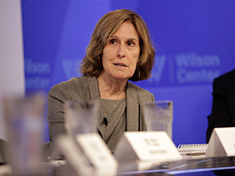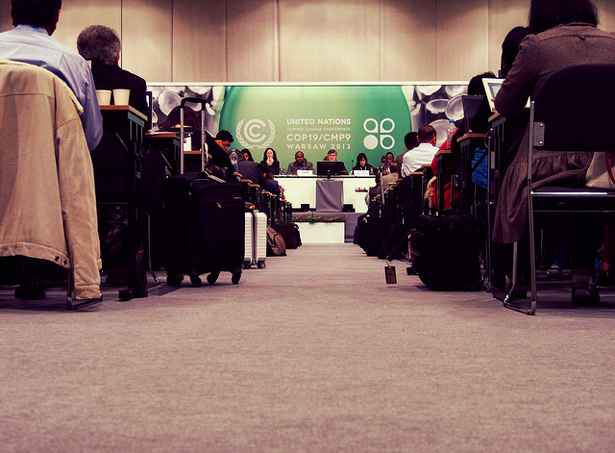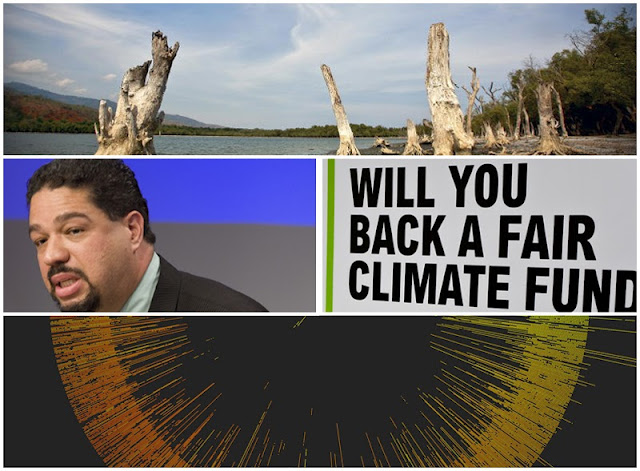-
ECSP Weekly Watch | October 21 – 25
›
A window into what we’re reading at the Wilson Center’s Environmental Change and Security Program
COP16 Begins in Colombia (Al Jazeera)
Almost 200 countries are gathering in Colombia for a two-week span (October 21 to November 1) for the UN Convention on Biodiversity to further global conservation goals. At COP15, the meeting culminated with an ambitious global treaty—the Kunming-Montreal Global Biodiversity Framework (2022)—that required member states to halt and reverse biodiversity loss. The agreement had four goals that set a “30×30“ agenda to protect 30% of global land, earth, and water ecosystems by 2030.
-
ECSP Weekly Watch | August 26 – 30
› A window into what we are reading at the Wilson Center’s Environmental Change and Security Program
A window into what we are reading at the Wilson Center’s Environmental Change and Security ProgramWorld Food Program Faces Scrutiny Over Fraud in Sudan (Reuters)
As Sudan suffers an immense humanitarian crisis due to an ongoing internal conflict between the Army Forces and the paramilitary Rapid Support Forces (RSF), the U.N. World Food Program (WFP) has provided crucial aid to people displaced by the conflict. Yet its ability to continue this crucial work is now under threat because of allegations of illicit activities made against its top officials in that country. These developments have drawn the attention of humanitarian practitioners and diplomats—who also have concerns regarding WFP’s mismanagement and how it might have contributed to the failure to deliver enough aid in Sudan.
-
ECSP Weekly Watch | July 29 – August 2
›
A window into what we are reading at the Wilson Center’s Environmental Change and Security Program
How One Loss and Damage Fund Bore Fruit (The Guardian)
The Loss and Damage Fund established during the UN COP27 was a monumental breakthrough in the climate finance realm and aimed to provide financial assistance to vulnerable nations impacted by climate change. Such damage can be catastrophic. When Cyclone Freddy hit Malawi in 2023, it killed 1,200 people and displaced 659,000 more. The estimated economic loss exceeded $1 billion, and it landed especially hard on farmers—including the women who make up more than 70% of Malawi’s agricultural workforce.
-
Climate Compensation: How Loss and Damage Fared in the Paris Agreement
›
The agreement coming out of the COP-21 negotiations gave breakthrough recognition to the concept of “loss and damage,” sorting through thorny discussions and politically charged negotiating positions. These positions revolved around liability and compensation, which developing countries called for but developed countries were unwilling to have included in the agreement.
-
John Furlow on Better Coordination for Better Climate Adaptation
› “We [need to] stop treating ‘adaptation’ like a sector,” says John Furlow, climate change specialist at the U.S. Agency for International Development (USAID), in this week’s podcast, “but start treating it as a stress or a risk that undermines the development sectors, the environmental sectors, the social sectors that we care about.”
“We [need to] stop treating ‘adaptation’ like a sector,” says John Furlow, climate change specialist at the U.S. Agency for International Development (USAID), in this week’s podcast, “but start treating it as a stress or a risk that undermines the development sectors, the environmental sectors, the social sectors that we care about.” -
“No Precedent in Human History”: Ruth Greenspan Bell on Why Climate Change Demands More Than the UNFCCC
›
The stakes are high for the UN climate conference in Paris later this year, so high in fact, some scholars feel it’s foolish to be putting all our eggs in one basket.
-
Gender Gaining Ground at Climate Change Negotiations
›
Last month, more than 10,000 negotiators from 189 countries attended the latest UN climate change conference, known as the 19th Conference of the Parties, or COP-19, this year held in Warsaw. To many, COP-19 fell frustratingly short of its already low expectations: there were no significant new agreements and 132 developing countries along with many major non-government groups staged a walkout in protest. However, it was notable for several signs of continued progress in bringing women’s voices to the negotiating table.
-
An Integrated Climate Dialogue
COP-16 Cancun Coverage Wrap-up
›December 13, 2010 // By Schuyler NullAfter focused last-minute negotiations, the UNFCCC COP-16 parties meeting in Mexico finally reached an agreement on a package being called “The Cancun Agreements” on Saturday. One of the most important impacts of the agreement (also referred to as the “balanced package”) is the establishment of a green climate fund which will help developing countries adapt to and mitigate the effects of climate change.
For more on the green fund as well as the integration of gender, population, development, and even a little bit of security in the broader climate dialogue, see The New Security Beat’s coverage of Cancun below.- Interview with Karen Hardee: Climate-Proofing Development
- Pop Audio: From Cancun: Roger-Mark De Souza on Women and Integrated Climate Adaptation Strategies
- Guest Contributor Alex Stark: From Cancun: Getting a Climate Green Fund
- The Number Left Out: Bringing Population Into the Climate Conversation
Kicking off our coverage was an email interview with Karen Hardee, visiting fellow with the Population Reference Bureau, on “climate-proofing” development. Hardee gives a brief overview of the UN National Adaptation Programmes of Action system and the current state climate adaptation integration in international development. She points out that one of the enduring positives from COP-15 was a renewed focus on financing tools that has permeated to the top levels of the UN.
Hardee also touched on the nascent but largely unfulfilled connection between population growth and resilience, noting that “of the first 41 programs submitted to the UNFCCC…37 noted that population growth exacerbated the effects of climate change, but only six explicitly stated that meeting an unmet demand for RH/FP should be a key priority for their adaptation strategy and only two proposed projects that included RH/FP.”
Next, Population Action International’s Roger-Mark De Souza was kind of enough to speak with us briefly over the phone from the conference itself, providing a run-down on a PAI-sponsored side event focusing on empowering women in climate debates.
“When you look at the negative impacts of climate change, the impacts on the poor and the vulnerable – particularly women – increase, so investing in programs that put women at the center is critical,” De Souza said.
Leaving gender issues, like child and maternal health and education, out of deliberations like those COP-16 are missed opportunities to get more “power for your peso,” he said.
Alex Stark, formerly of CNAS and now with the Adopt a Negotiator program in Cancun, provided an update and a strong argument for one of the most critical elements of the “balanced package” that many are hoping will come out of Cancun – the establishment of an international fund to help pay for adaptation and mitigation programs in developing countries.
Stark provides an insight into some of the chatter on the floor at COP-16 and also outlines the moral, development, and security advantages to supporting a green fund, pointing out that “by managing displacement, migration, and violent conflict driven by the effects of climate change, such as water scarcity, climate change adaptation can help bolster international security and stability.”
“Within the UN process itself,” she writes, “a robust, well-run, equitable green fund would help rebuild the trust lost between developed and developing countries at Copenhagen last year.”
Lastly, Bob Engelman, of the Worldwatch Institute, provides a broad argument for more inclusion of a key variable in climate debates – population (and not in the Ted Turner mold). He enumerates the common pitfalls of population debates, from sensitivities about personal choices to squeamishness about sexuality and reproductive health, and just plain gender bias.
But despite these barriers, says Engelman, population – and not just growth but demographics too – matters in the climate debate and therefore needs to be part of the conversation (an argument he makes more comprehensively in a new report, Population, Climate Change, and Women’s Lives). Echoing De Souza, he concludes by pointing out that although the discussion may be difficult, the solution is relatively simple: “On population, the most effective way to slow growth is to support women’s aspirations.”
“As societies, we have the ability to end the ongoing growth of human numbers – soon, and based on human rights and women’s intentions,” Engelman said. “This makes it easy to speak of women, population, and climate change in a single breath.”
Sources: Population Action International, Slate, UN Framework Convention on Climate Change, The Washington Post, Worldwatch Institute.
Photo Credit: Adapted from “Trees Dead on Shore of Timor-Leste Lake,” courtesy of flickr user United Nations Photo; Roger-Mark De Souza, courtesy of David Hawxhurst/Wilson Center; “Will you back a climate fund?,” courtesy of flickr user Oxfam International; and “Met Office Climate Data – Month by Month (September),” courtesy of flickr user blprnt_van.
Showing posts from category COP-16.



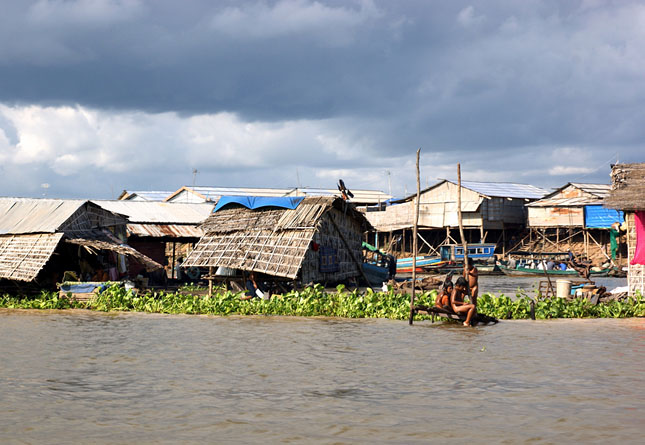
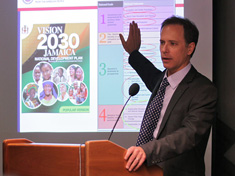 “We [need to] stop treating ‘adaptation’ like a sector,” says John Furlow, climate change specialist at the U.S. Agency for International Development (USAID), in this week’s podcast, “but start treating it as a stress or a risk that undermines the development sectors, the environmental sectors, the social sectors that we care about.”
“We [need to] stop treating ‘adaptation’ like a sector,” says John Furlow, climate change specialist at the U.S. Agency for International Development (USAID), in this week’s podcast, “but start treating it as a stress or a risk that undermines the development sectors, the environmental sectors, the social sectors that we care about.”